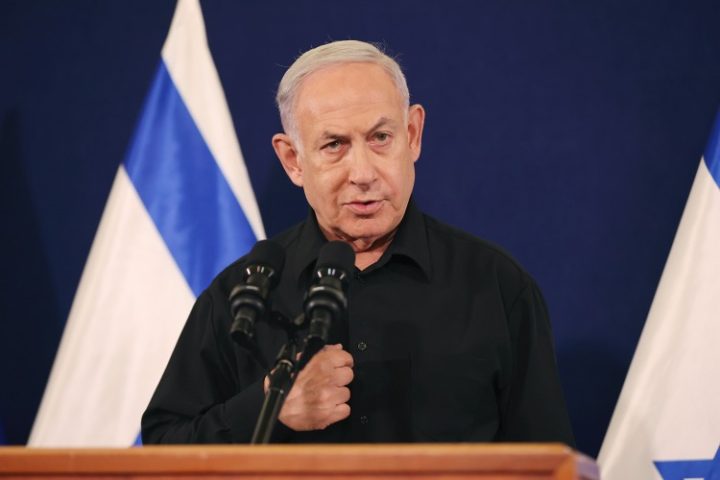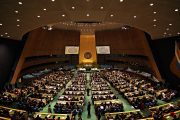
During a press conference on October 30, Israeli Prime Minister Benjamin Netanyahu categorically dismissed the notion of a ceasefire in Gaza, stating that any lull in hostilities amounted to a victory by the terrorist group Hamas.
“Calls for a ceasefire are calls for Israel to surrender to Hamas, to surrender to terrorism, to surrender to barbarism,” Netanyahu declared to reporters, pledging “that will not happen.”
“Just as the United States would not agree to a ceasefire after the bombing of Pearl Harbor or after the terrorist attack of 9/11, Israel will not agree to a cessation of hostilities with Hamas after the horrific attacks of October 7,” he elaborated.
“Today, we draw a line between the forces of civilization and the forces of barbarism,” Netanyahu continued, alleging that countries that did not back Israel in “a war for our common future” were placing themselves in harm’s way.
“If Hamas and Iran’s axis of evil wins, you will be their next target,” the Israeli leader cautioned, promising to fight until Hamas was eradicated.
Unlike Hamas, which Netanyahu maintained was purposely targeting civilians with decapitations, rapes, and other atrocities, the Israeli PM claimed that the Israel Defense Forces (IDF) were trying to avoid killing Palestinian civilians. “Even the most just wars have unintended civilian casualties,” he stated.
International human-rights observers have denounced Israel for collectively penalizing Gaza’s civilian population, pointing to Israel’s targeting of hospitals, schools, and other civilian infrastructure and the withholding of food, water, medicine, and electricity as breaches of international humanitarian law. For its part, Israel has insisted that Hamas uses civilian facilities as human shields and appropriates humanitarian aid deliveries.
Since declaring war on Hamas following the terrorist group’s brutal attack on October 7, Israel has reportedly killed more than 8,300 Palestinians. The UN’s human rights body has accused Jerusalem of war crimes, including genocide, describing an evacuation order issued to over one million inhabitants of northern Gaza as a thinly veiled attempt at ethnic cleansing under the fog of war.
On October 28, the UN General Assembly passed a resolution urging for an immediate ceasefire in Gaza. Only 14 member states — including Israel and the United States — objected to the resolution, while 45 abstained. Israel has since mobilized tanks to Gaza as part of a planned ground operation.
Last week, UN Secretary General António Guterres proclaimed in a speech to the Security Council that Hamas’ attack had not occurred “in a vacuum” and slammed Israel for the “56 years of suffocating occupation” it had enforced on Palestinians. In turn, Israel subsequently vowed to reject visa applications by UN officials, lambasting Guterres for trying to justify Hamas’ attack.
On October 29, The New York Times reported that Israeli security services had cautioned Netanyahu for months that his domestic policies were contributing to risky political chaos, with officials allegedly emphasizing that domestic strife was undermining Israeli security while fortifying Israel’s enemies.
The news report was part of an evaluation of what caused the recent rise in tensions between Israel and the Palestinians. At one point in July, the prime minister even reportedly denied a meeting with a senior general who was attempting to provide a threat warning, according to classified intelligence.
The same Times report pointed out that Israeli security representatives also miscalculated the threat Hamas posed, including in the weeks leading up to the October 7 attack on Israeli territory which led to the deaths of up to 1,400 people.
Moreover, the Times reported that Israeli military intelligence had thought since May 2021 that Hamas was not keen on any large-scale assaults from Gaza, but was instead planning an operation in the West Bank, dominated by the Palestinian Authority, a rival to Hamas.
Both Netanyahu and top Israeli security staff had misjudged the threat from Hamas and failed to channel ample resources to tackling the Palestinian militant group, as they felt that Iran and the Lebanese militant group Hezbollah were more of a risk to Israel, according to the Times.
Even when senior Israeli officials concluded in September that Israel could be attacked on various fronts in the coming weeks or months by Iran-supported militia groups, there was no indication of a potential assault from Gaza at that time.
The Times further explained the success of Hamas’ surprise assault in early October, stating that U.S. intelligence agencies had largely ceased monitoring the group, believing that Israel was already managing it.
Many top Israeli officials have admitted responsibility for their errors in judgment. Netanyahu, however, posted to X on October 28 decrying his cabinet for not forestalling the October 7 attack. Subsequently, after receiving backlash, Netanyahu deleted his post and posted an apology on October 29 stating, “I was wrong,” pledging to fully support the heads of Israel’s security agencies.
Netanyahu’s remarks came after U.S. House Foreign Affairs Committee head Michael McCaul alleged earlier this month that Egypt, which borders Gaza, had cautioned Israel against potential clashes several days before the October 7 attack. Netanyahu, nonetheless, rebuffed reports about the Egyptian warning as “totally fake news.”
Benny Gantz, a member of Israel’s war cabinet and former defense minister, called on Netanyahu to “retract his statement … and stop dealing with the issue.”
“When we are at war, leadership must show responsibility … and strengthen the forces in a way that they can … realize what we demand from them. Any other action or statement — harms the people’s ability to stand and their strength,” Gantz added.
Opposition leader Yair Lapid similarly rebuked the Israeli prime minister for “crossing a red line.” While Israeli soldiers “are fighting bravely against Hamas and Hezbollah, [the prime minister] is trying to blame them, instead of supporting them,” Lapid claimed.
On October 30, in a speech before a closed-doors meeting with members of the Russian Security Council and heads of law enforcement agencies, Russian President Vladimir Putin denounced Israel’s ongoing bombing campaign against Gaza, stating that such actions were unjustifiable.
“The horrible events currently unfolding in the Gaza Strip, when hundreds of thousands of innocent people are getting indiscriminately annihilated, have nowhere to run, nowhere to hide from bombardment, cannot be justified by anything,” Putin stated.
Israel’s actions in the Palestinian enclave only provoked fury, the Russian leader insisted, adding that one should not be led by “emotions” in tackling the situation in the Middle East.
“When you’re watching bloodied children, dead children, suffering of the elderly, death of medics — fists are clenching and tears are welling up. Yet we should not, we cannot allow ourselves to be led by emotions,” Putin stated.
The ongoing crisis in the Middle East began with a “terrorist attack” on Israeli civilians, Putin pointed out. Nevertheless, rather than “punishing” those behind it, Israel “unfortunately” chose “vengeance” and assigned “collective responsibility” for it, Putin continued.



